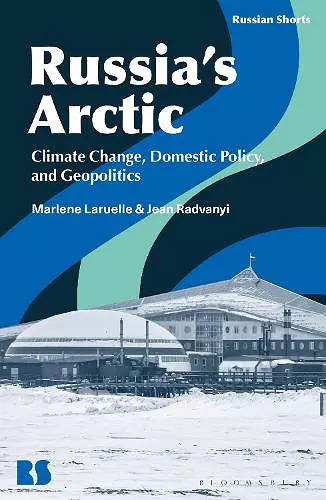Russia’s Arctic
Climate Change, Domestic Policy, and Geopolitics
Professor Marlene Laruelle author Emeritus Professor Jean Radvanyi author
Format:Hardback
Publisher:Bloomsbury Publishing PLC
Publishing:22nd Jan '26
£50.00
This title is due to be published on 22nd January, and will be despatched as soon as possible.

An exploration of Russia’s Arctic policies and the strategic development of Russia’s regions and the Northern Sea Route since the beginning of the Russo-Ukrainian War.
This book provides a comprehensive overview of Russia’s Arctic policies since the 2022 war with Ukraine began. Covering geopolitical transformations, domestic evolutions and the role of climate change, it traces how, for around two decades, Russia has renewed its strategic interest in the Arctic region. It reflects on how, with more than half of the circumpolar territories, Russia’s Arctic regions generate between 10 and 15% of Russia's GDP and a quarter of its exports, with the yet-to-be-explored reserves of the Arctic continental shelf also offering immense potential.
Russia’s Arctic analyses the growth of hydrocarbon deposits in the far north of Siberia and nearby offshore areas and how this has contributed to the rapid development of the Northern Sea Route. Marlene Laruelle and Jean Radvanyi examine the tremendous long-term importance of the region for Russia, regardless of internal political developments and the state of relations with the West. Long a place for science diplomacy and transborder dialogue, the region has once again become a hotspot for geostrategic tensions and a new interface between an expanded NATO and Russia. While the West is imposing increasingly broad sanctions specifically targeting Arctic hydrocarbon development projects, the Russian government is striving to circumvent or mitigate their effects with countermeasures by relying on their allies, most of whom are Asian.
Laruelle and Radvanyi convincingly contend that Russian Arctic development policy must take into account the economic needs of the Russian budget and the geopolitical realities of decoupling from the West and pivoting towards the so-called ‘Global South’. Additionally, it must consider the heavy legacies of the past in terms of population, infrastructure, and pollution, as well as future projections regarding the impact of climate change.
In a rapidly expanding field, Russia’s Arctic establishes itself as a new standard reference. Laruelle and Radvanyi provide a historically grounded analysis of the domestic and international dimensions of Moscow's Arctic policy, engaging critically with geopolitical contestation while keeping focus on the social and ecological fragility of the Russian north. * Lukas Wahden, Sciences Po Paris, author of the Substack "66° North" *
The long shadow of the Ukraine War has disrupted many cooperative endeavours in the Arctic and upped the intensity of geopolitical tensions. This impeccably researched book examines these impacts and demonstrates how unsustainable Russia’s plans for both economic development and militarization of its vast Arctic territories have become. * Pavel K. Baev, Research Professor, Peace Research Institute Oslo, Norway *
ISBN: 9781350552579
Dimensions: unknown
Weight: unknown
160 pages